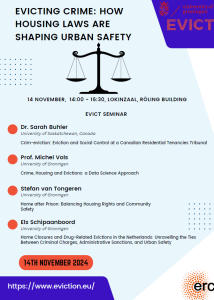 On 14 November, between 14:00 and 16:30, Associate Professor Sarah Buhler (University of Saskatchewan, Canada) will give a seminar in the Lokinzaal as part of the EVICT project. She will discuss her to-be-published paper, which she describes as follows:
On 14 November, between 14:00 and 16:30, Associate Professor Sarah Buhler (University of Saskatchewan, Canada) will give a seminar in the Lokinzaal as part of the EVICT project. She will discuss her to-be-published paper, which she describes as follows:
“My article conducts a critical reading of decisions of Saskatchewan’s residential tenancies tribunal that address landlord applications for immediate eviction based on tenant behaviours that are alleged to be criminal, illegal, frightening, or dangerous. Coining the term “crim-eviction” to help describe this category of eviction decisions, the article identifies that residential tenancies tribunals are actively involved in the governance of perceived crime and disorder and the discipline and management of marginalized tenants through eviction processes. Whether or not criminal or illegal activity is alleged, the crim-eviction cases mobilize tropes and fears about crime, disorder, risk, and danger to rationalize the expulsion of tenants from their homes. Hearing officers draw on these familiar discourses and tropes, applying them in an administrative law context where formal rules of evidence do not apply, where appellate scrutiny is rare, where tenants almost never have legal assistance, and where tenants are already highly marginalized.”
Then, Michel Vols (University of Groningen, Netherlands) will be presenting the findings of a recent EVICT data science project that analyzed over 6,000 Dutch court judgments on evictions. These data were collected and enhanced using machine learning. The paper will delve into the number of eviction cases involving crime, nuisance, and other antisocial behaviour. It will also explore how tenants defend themselves against eviction claims, whether they have legal representation, and whether courts are more stringent in cases involving certain types of misconduct.
After the first Q&A session, Stefan van Tongeren (University of Groningen, Netherlands) will talk about his research on balancing housing rights of ex-prisoners and the right to safety of communities.
Finally, Els Schipaanboord (University of Groningen, Netherlands) will present the preliminary findings of her research on the closure of drug premises based on Article 13b of the Opium Act. She focuses on the relationship between administrative sanctioning and the concept of a ‘criminal charge’, as well as the subsequent right to a fair trial/due process of law.
Programme
14:00 Opening by Els Schipaanboord
14:10 Talk by Sarah Buhler – ‘Crim-Eviction: Eviction and Social Control at a Canadian Residential Tenancies Tribunal’
14:40 Talk by Michel Vols – ‘Crime, Housing and Evictions: a Data Science Approach’
15:10 Q&A
15:30 Talk bij Stefan van Tongeren – ‘Home after Prison: Balancing Housing Rights and Community Safety’
15:45 Talk by Els Schipaanboord – ‘Home Closures and Drug-Related Evictions in the Netherlands: Unravelling the Ties between Criminal Charges, Administrative Sanctions, and Urban Safety’
16:00 Q&A and discussion
16:15 Concluding remarks
The event is held on-site in Groningen. Online attendance will not be possible.
More events
Find out about upcoming events about eviction law.

